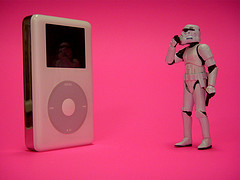By Wendi E. Berry

This summer I let a fellow writing teacher intimidate me with technology. He handed me an iPod and said, “Pick out a song” and I was baffled and more than a little embarrassed that I did not know how. “Like this,” he said, spinning the whirligig that I’ve since learned is called a click wheel and selecting a song by Radiohead.
It was enough to provoke me into learning how to use the card-sized plastic and metal audio device and to begin to consider applications for my first Advanced Academic Writing class at the School of Professional & Continuing Studies. My suspicion that I was onto something were confirmed by Assistant Professor Kevin Bruny’s presentation at the annual spring faculty meeting on how his human resource management class benefitted from the audio and video capability of iPods.
Since then, I’ve done research and found that Duke University successfully piloted the use of iPods to first-year students in 2004, and Middlebury College students had “mixed success” using them for 2005-2006 summer language school, success with “pronunciation and vocabulary studies” and minor problems uploading to the Web.
Crispin Dale of the University of Wolverhampton in the U.K. reported in 2008 on “Podogogy” in the International Journal of Teaching and Learning in Higher Education, in other words, the ways iPods stimulated creativity in learning and teaching college level dance, theater, and music classes (4).
A key feature of iPod in the college classroom, according to Peter Galuszka in a 2005 article “Technology’s Latest Wave” in Black Issues in Higher Education, is its portability. Give students an iPod and they can take lectures with them, in their suitcase, to meetings, and standing in line at the DMV (in the DMV’s defense, the last time I only had to wait three minutes). Middlebury’s writing program, according to a case study posted on Educause, embraced iPods to record class sessions and post on a blog. In my SPCS class, I have adult learners, and like me, they seem hesitant to take risks, not just with whirligigs but on taking chances with their writing.
My first idea, therefore, was to ask them to go all out in critiquing a movie, book, or TV episode they’ve seen, heard, or read lately and record their voices reading these reviews aloud. I assigned their choice of a “rave” or a “slam,” an exercise borrowed from Richard Johnson-Sheehan and Charles Paine’s Writing Today that walks students through arriving at evaluation criteria, a necessary component in writing research papers.
On Feb. 23, I will hold my breath a little as students use a USB cable to upload the wav files onto Blackboard, and I take comfort in having backup–student technicians to answer questions at the CTLT. The next step will be listening to each other’s podcasts and commenting through discussion threads on tone and word choice. My dream-scenario is that my writing students will begin to see a range of what’s possible with persona and language in arguing a point.
Another idea for how to use iPods came to me while talking to Ken Warren, Academic Technology Consultant at the Center for Teaching, Learning, and Technology. Why not use them as mobile learning tools for revision? My students are already reading their work aloud. Each time they bring in an assignment, I ask them to share a selected section.
Hearing where they stop, falter, and self-correct can become an impetus for revision perhaps more so than feedback. With iPods, they can record their voice, play it back, and listen to how their writing sounds. Many SPCS students work full-time, and the iPod lets them record, listen, and reflect, no matter where they are in the queue to renew license and tags.
Are we there yet? Are my students using iPods to revise? I know one of my students has been using hers because last Thursday she informed me she’d misplaced the little white cable that powers it up when the battery dies. I’ll let you know how the rave and slam assignment goes. In the meantime, I’m relying on staff at the CTLT for allaying whirl-and-click trepidations and answering questions, mostly mine.
Works Cited
Dale, Crispin. “iPods and Creativity in Learning and Teaching: An Instructional Perspective.”
International Journal of Teaching and Learning in Higher Education. 20.1 (2008):1-9. ProQuest. Web. 12 Feb. 2012.
Galuszka, Peter. “Technology’s Latest Wave.” Black Issues in Higher Education 22.2 (2005): 24-
28. Education Research Complete. Web. 12 Feb. 2012.
“Middlebury College Case Study.”Educause. 1999-2012. Web. 13 Feb. 2012.
http://www.educause.edu/ELI/ELIDiscoveryToolGuidetoPodcast/MiddleburyCollegeCaseStudy/13059